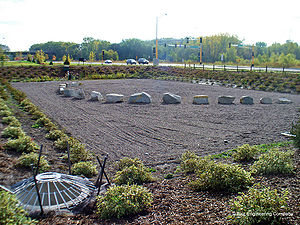
Difference between revisions of "Sand filter"
m |
m |
||
| Line 6: | Line 6: | ||
*[[Types of sand (media) filters]] | *[[Types of sand (media) filters]] | ||
*[[Design criteria for sand (media) filters]] | *[[Design criteria for sand (media) filters]] | ||
| + | *[[Design criteria for filtration]] | ||
*[[Construction specifications for sand (media) filters]] | *[[Construction specifications for sand (media) filters]] | ||
*[[Assessing the performance of sand (media) filters]] | *[[Assessing the performance of sand (media) filters]] | ||
Revision as of 13:58, 13 December 2022
Sand filters, also called media filters or filtration basins, are a stormwater quality treatment system that works by capturing stormwater runoff and allowing this water to percolate through a sand-based filter media. Sand filters are very effective at removing sediment and pollutants attached to sediment. They do not provide reductions in the volume of runoff and have limited effectiveness for dissolved pollutants unless they are modified. They are suitable for all land uses, as long as the contributing drainage areas are limited (e.g., typically less than 5 acres). Media filters are not as aesthetically appealing, which makes them more appropriate for commercial or light industrial land uses or in locations that will not receive significant public exposure. Media filters are particularly well suited for sites with high percentages of impervious cover (e.g., greater than 50%). Media filters are typically designed with an underdrain, which makes them a good option for treating potential stormwater hotspots (PSHs). They can also be installed underground to prevent the consumption of valuable land space (often an important retrofit or redevelopment consideration).
- Overview for sand (media) filters
- Types of sand (media) filters
- Design criteria for sand (media) filters
- Design criteria for filtration
- Construction specifications for sand (media) filters
- Assessing the performance of sand (media) filters
- Operation and maintenance of sand (media) filters
- Calculating credits
- Cost-benefit considerations for sand (media) filters
- References for sand (media) filters
- Requirements, recommendations and information for using sand filter as a BMP in the MIDS calculator
- Links to detail images
- Perimiter sand filter details: File:Perimeter Sand Filter PERIMETER SAND FILTER DETAILS (1).pdf
- Surface sand filter: File:SURFACE Sand Filter3 Surface sand filter (1).pdf
- Underground sand filter: File:UNDERGROUND SAND FILTER Layout2 (1).pdf
- Sand filter and iron enhanced sand filter photos
- Sand filter and iron enhanced sand filter tables
- Fact sheet for filtration (Includes vegetated filters)
